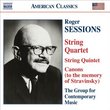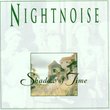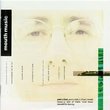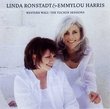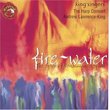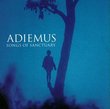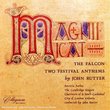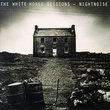| All Artists: George Frideric Handel, Charles Mackerras, Bryn Terfel, Scottish Chamber Orchestra Title: Bryn Terfel - Handel Arias / Scottish CO, Mackerras Members Wishing: 0 Total Copies: 0 Label: Deutsche Grammophon Release Date: 10/14/1997 Genre: Classical Styles: Opera & Classical Vocal, Historical Periods, Baroque (c.1600-1750) Number of Discs: 1 SwapaCD Credits: 1 UPC: 028945348025 |
Search - George Frideric Handel, Charles Mackerras, Bryn Terfel :: Bryn Terfel - Handel Arias / Scottish CO, Mackerras
 | George Frideric Handel, Charles Mackerras, Bryn Terfel Bryn Terfel - Handel Arias / Scottish CO, Mackerras Genre: Classical
Bryn Terfel has it all. His rich, deep baritone voice is capable of navigating the rapids and doing the vocal leaps and cartwheels that Handel routinely demands of his singers, even the ones with big, deep voices that usua... more » |
Larger Image |
CD DetailsSynopsis
Amazon.com essential recording Bryn Terfel has it all. His rich, deep baritone voice is capable of navigating the rapids and doing the vocal leaps and cartwheels that Handel routinely demands of his singers, even the ones with big, deep voices that usually move more slowly. He is Welsh, and in his mastery of words--clarity of projection and precise emotional expression--he calls to mind another great Welsh performer, Richard Burton. This recital, accompanied by Sir Charles Mackerras with skill and sensitivity, runs the whole gamut of Handel's vocal styles, from military bluster (powerfully present in the first aria, "Arm, arm, ye brave") to humble piety (in the second selection, "Vouchsafe, O Lord"). There is erotic awe in "Where'er you walk," comic grotesquerie in "O ruddier than the cherry," and pure splendor in "The trumpet shall sound." A marvelous recital. --Joe McLellan Similar CDsSimilarly Requested CDs
|
CD ReviewsLISTEN TO TERFEL MOVIE MAVEN | New York, NY USA | 02/02/2002 (5 out of 5 stars) "Since leading roles for bass-baritones in the operas of Handel are very, very rare, it is quite doubtful that we'll soon be seeing operatic super-star BRYN TERFEL in any international theatre performing what he says is a great love of his. This is truly a pity since it is more than a little uncommon to see and hear acting as fine as Terfel's coupled with a voice as rich and expressive as his.Just a few nights ago, I was watching a television concert from Europe in which Anne Sofie von Otter sang 'Carmen' to Terfel's 'Escamillo' in selections from Bizet's opera. The old war horse 'The Toreador Song' has never sounded this fresh and exciting. Terfel can do what few others in his profession know how to do: he gets into the words as well as the music; he actually plays the character and presents what the composer and librettist might only have dreamed about.Handel's operas, all of them so difficult in their coloratura passages, are seldom actually acted. One might as well just hear a concert version. But Terfel, as proven in this recording, acts as well as sings. My favorites include arias from JULIUS CAESAR and ALCINA, but every band on this CD is a winner.Gorgeously conducted by Sir Charles Mackerras, the recording includes arias from the famous oratorios as well as from the operas: JUDAS MACCABAEUS and ALEXANDER'S FEAST are especially beautifully performed. And if you are used to a pallid, rumbling, muffled bass in your annual production of MESSIAH, listen to Terfel. HIGHLY RECOMMENDED." "I rage, I rage, I melt, I burn!" E. A. Lovitt | Gladwin, MI USA | 11/05/2003 (5 out of 5 stars) "This CD showcases popular Welsh bass-baritone Bryn Terfel raging, melting, and burning his way through a wonderful variety of Handel arias (although I would have left out the 'Messiah' selections and gone for a few of Handel's 2,000 or so less-recorded songs).According to Gerald Abraham in "Handel, a Symposium" the heroes that Terfel chose to bring to life in this recording generally had high soprano voices. Tenors and baritones were relegated to subordinate parts, and basses to those of tyrants or sages: "... in modern revivals of Handel's operas it is generally fatal to give [the castrato] parts to tenors or baritones to sing an octave lower."In the first selection, Terfel takes on the role of Simon, brother of Judas Maccabaeus, which was originally a bass role. Critic Abraham could not object to this, although he might have a problem with the transposition of the arias for Demetrius ("Berenice, Queen of Egypt"), Caesar ("Julius Caesar in Egypt"), and Xerxes ("Xerxes"). If you are a purist, this CD might not be for you, but you'll miss out on some grand singing. I'm especially fond of Terfel's handling of the slow, reflective arias "Verdi prati, selve amene" from 'Alcina,' and "Ombra mai fu" from 'Xerxes' (often called "Handel's Largo" despite the composer's "larghetto" marking). Here, the singer shuns lachrymose emoting. It is the purity of his tone and choice of dynamics that touch the heart. "O ruddier than the cherry" from "Acis and Galatea" is robustly sung by the love-sick Polyphemus/Terfel. In spite of the buoyant central rhythm, every word is clearly enunciated. The preceding, accompanied recitative "I rage, I rage, I melt, I burn!" is a masterful, shimmering growl of emotion.Along with Xerxes's plane tree and Polyphemus's cherries, Terfel returns to an arboreal subject in "Where'er you walk" from Semele. His command of musical and textual nuance is impressive in this tenderly sung aria. The ornamentation by Sir Charles Mackerras enhances rather than detracts from this beautiful love song. Another highlight of this CD is Terfel's interpretation of "Revenge, revenge, Timotheus cries" from "Alexander's Feast." He snarls through the trumpets with frenzied, dead-on ornamentation. However there are a few unusual hesitations, such as a slight pause between 'Timotheus' and 'cries,' and at first hearing, I didn't care for them. Now they make textual sense to me. His hissing snakes and sparkling eyes are flawlessly emphasized. Each melisma is rhythmically unique and perfectly inflected. The last three selections from Handel's "Messiah" are unfortunately rather ordinary. "Why do the nations" has a strange repeat, and Terfel seems to be singing it up into his mask which makes it sound two-dimensional. There is also a little too much flattening or 'whitening' of the melismas, plus an occasional unattractive growl. I much prefer Samuel Ramey's deep, seamless coloratura in these three bass arias.Perhaps Handel's "Messiah" is one of those works that truly separates the bass-baritones from the basses.Other than the above complaint, Bryn Terfel pays grand homage to the dramatic tension, the text, and the musicality of Handel's arias." Very enjoyable Paul Werner | Seattle | 12/20/1999 (5 out of 5 stars) "Absolutely beautiful, very enjoyable during the holidays. If your a Handel or Bryn Terfel fan you won't go wrong this selection."
|

 Track Listings (20) - Disc #1
Track Listings (20) - Disc #1
